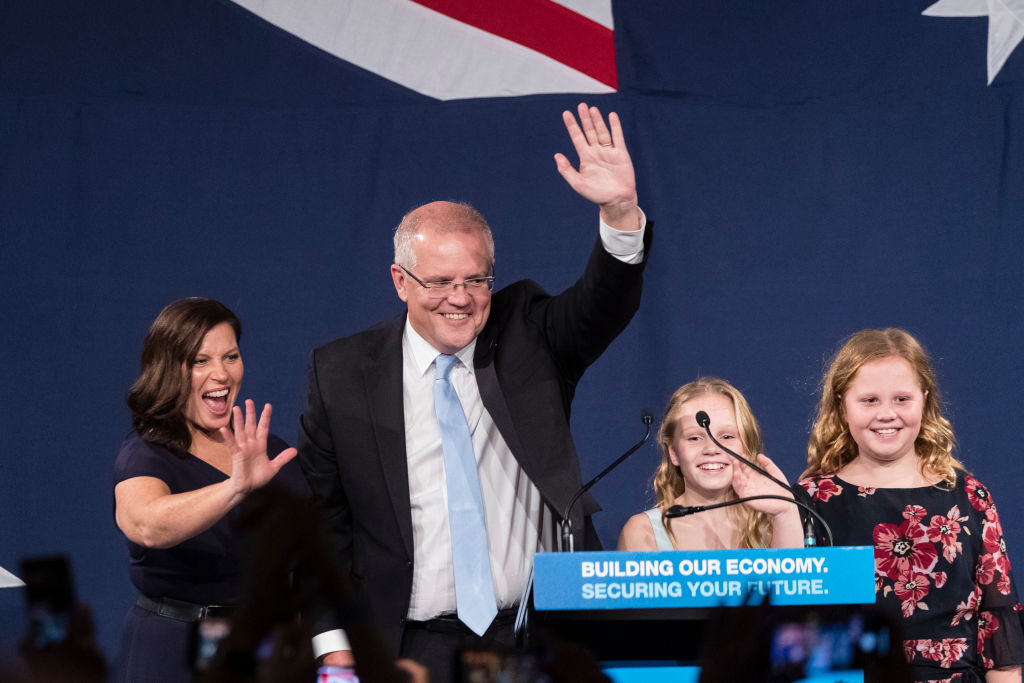Australia's election in the spotlight
Scott Morrison confounds pollsters to win knife-edge election - what does shock victory mean?


A free daily email with the biggest news stories of the day – and the best features from TheWeek.com
You are now subscribed
Your newsletter sign-up was successful
Australia’s electorate defied predictions on Saturday, when it carried Prime Minister Scott Morrison and the incumbent Liberal-National conservative coalition government to a shock victory.
The Labor opposition, led by Bill Shorten, was ahead in almost every opinion poll for three years - some commentators called the election ‘unlosable’ - but on the day their progressive social, environmental, and fiscal policies failed to generate enough support to carry the vote.
In counting late on Sunday, 73 of 151 House of Representatives seats had gone to conservative candidates, closing Labor’s path to victory and prompting Shorten to announce his resignation amid a bitter internal post-mortem.
The Week
Escape your echo chamber. Get the facts behind the news, plus analysis from multiple perspectives.

Sign up for The Week's Free Newsletters
From our morning news briefing to a weekly Good News Newsletter, get the best of The Week delivered directly to your inbox.
From our morning news briefing to a weekly Good News Newsletter, get the best of The Week delivered directly to your inbox.
The final count, expected today, will determine if the conservative coalition holds a slender legislative majority, or, as seems likely, be left negotiating for votes in a hung parliament.
The results conform to a pattern now familiar in democracies across the world. As The Guardian reports: “Inner metropolitan Australia swung to Labor in its safe seats and in safe Liberal seats... but the outer suburbs and regional Australia swung in the other direction.”
Writing in the Guardian, Brigid Delaney reflects that as with the UK and US election shocks of 2016, “part of the national trauma was the realisation that one part of the country was so ill-acquainted with the other part”.
Indeed, during Bill Shorten’s concession speech, one crestfallen supported was heard to shout: “It’s not you Bill, it’s the country.”
A free daily email with the biggest news stories of the day – and the best features from TheWeek.com
However, while many news outlets paint the weekend’s results as the latest domino to fall in the global swing to the right, in the Sydney Morning Herald, Sean Kelly says that the outcome should not be seen as a wholesale rejection of the progressive agenda.
“The lesson, I suspect, is more specific, about creating losers on taxation. Similarly, there will be arguments that this result repudiates action on climate change. But hasn't Morrison invested months in trying to repair the Coalition's image on this issue? Little here is simple,” he writes..
Among the reasons theorised for Labor’s loss are Australia’s cautious, change-wary voters, Mr Shorten’s lack of charisma - the Financial Times carries a quote calling him “Australia’s Ed Miliband” - and the party’s over-abundance of policies.
The Labor campaign was “hampered by a blizzard of policies that tended to obscure one another and rhetoric that veered towards class warfare”, says The Age. In contrast, Morrison campaigned with a “simpler line of attack”.
Liberal strategist Grahame Morris told the publication: “The Labor program gave the Coalition something strong to run on every day: 'the Bill you can't afford'.”
In The Daily Telegraph, Matthew Lesh sees lessons for the UK’s Conservatives: “The message for the Conservatives in the UK is clear: create brand differentiation from Labour, be the party of lower taxes and aspiration – and never give up. Then an unexpected victory could be heading your way”.
William Gritten is a London-born, New York-based strategist and writer focusing on politics and international affairs.
-
 The environmental cost of GLP-1s
The environmental cost of GLP-1sThe explainer Producing the drugs is a dirty process
-
 Greenland’s capital becomes ground zero for the country’s diplomatic straits
Greenland’s capital becomes ground zero for the country’s diplomatic straitsIN THE SPOTLIGHT A flurry of new consular activity in Nuuk shows how important Greenland has become to Europeans’ anxiety about American imperialism
-
 ‘This is something that happens all too often’
‘This is something that happens all too often’Instant Opinion Opinion, comment and editorials of the day
-
 Epstein files topple law CEO, roil UK government
Epstein files topple law CEO, roil UK governmentSpeed Read Peter Mandelson, Britain’s former ambassador to the US, is caught up in the scandal
-
 Iran and US prepare to meet after skirmishes
Iran and US prepare to meet after skirmishesSpeed Read The incident comes amid heightened tensions in the Middle East
-
 Israel retrieves final hostage’s body from Gaza
Israel retrieves final hostage’s body from GazaSpeed Read The 24-year-old police officer was killed during the initial Hamas attack
-
 China’s Xi targets top general in growing purge
China’s Xi targets top general in growing purgeSpeed Read Zhang Youxia is being investigated over ‘grave violations’ of the law
-
 Panama and Canada are negotiating over a crucial copper mine
Panama and Canada are negotiating over a crucial copper mineIn the Spotlight Panama is set to make a final decision on the mine this summer
-
 Why Greenland’s natural resources are nearly impossible to mine
Why Greenland’s natural resources are nearly impossible to mineThe Explainer The country’s natural landscape makes the task extremely difficult
-
 Iran cuts internet as protests escalate
Iran cuts internet as protests escalateSpeed Reada Government buildings across the country have been set on fire
-
 US nabs ‘shadow’ tanker claimed by Russia
US nabs ‘shadow’ tanker claimed by RussiaSpeed Read The ship was one of two vessels seized by the US military
